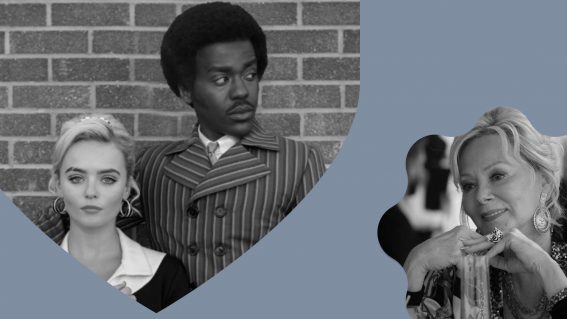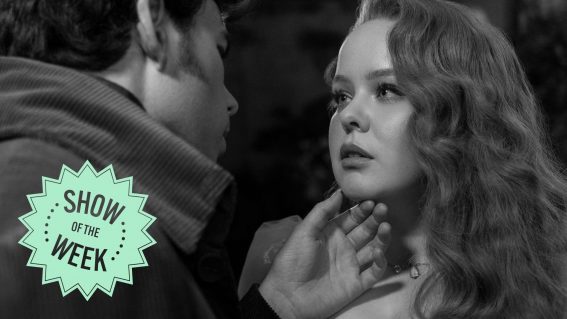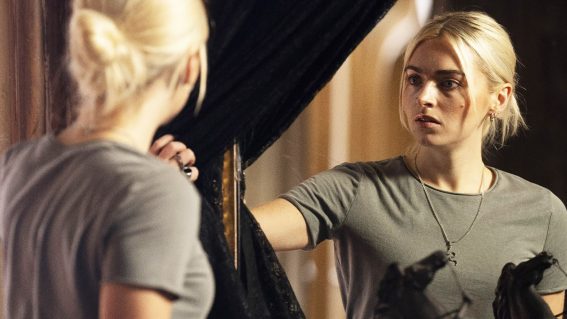You might question the ethics of everyone involved in Hollywood Con Queen

Clarisse Loughrey’s Show of the Week column, published every Friday, spotlights a new show to watch or skip. This week: Hollywood Con Queen investigates a serial scammer impersonating high profile Tinseltown execs.
Hollywood Con Queen, Apple TV+’s three-part docuseries, gives its game away with a single, passing comparison to the Joker. Hollywood Reporter journalist Scott Johnson first broke the story in 2018 of a scammer who’d impersonated multiple high-profile women in the film industry—among them Sony’s Amy Pascal, Lucasfilm’s Kathleen Kennedy, and entrepreneur Wendi Deng Murdoch—in order to lure hundreds of freelance professionals to Indonesia on the promise of work. Once there, they’d be pressured into paying out of pocket for various fees and transportation costs. The money was never reimbursed. Nor did any of these promised opportunities materialise.
Private investigator Nicole Kotsianas, hired on behalf of some of the women targeted, followed a trail of clues that eventually led her, and Johnson, to an individual named Hargobind Tahilramani. He was nicknamed “The Con Queen of Hollywood”—the title, too, of a 2023 book written by Johnson.
What was odd about the scam is that the amount of money stolen never seemed to justify the level of effort put into its pursuit. Victims would be approached by someone who seemed to know an intense amount about their personal and professional lives. They would be badgered by daily phone calls and high-wire manipulation. “It wasn’t really about the money, it was about something else,” Johnson concludes. Then, of course, we’re delivered the armchair diagnosis. Tahilramani must be some kind of “psychopath” who takes pleasure in dashing people’s creative dreams. But, aha! What if there were some kind of hidden, childhood trauma that could frame his actions as a plan of vengeance against a world that wounded him? Wouldn’t that be dramatically satisfying?
Then the clips start to play: Joaquin Phoenix, Heath Ledger, Jack Nicholson, all dolled up in their clown makeup, looking dead-eyed into the camera. And, granted, Tahilramani rambling to Johnson on the phone about how he “may be just the nicest criminal you’d ever know” sounds uncannily like the wavering, frail voice Phoenix adopts for his 2019 take on the most conniving of DC’s rogues gallery, as he rants to Robert de Niro’s talk show host about “society” and the “mentally ill loner”.
But that’s a superficial aside—actually dedicating any significant screen time to it makes it very clear that Johnson, and series director Chris Smith, don’t want Tahilramani to be a real person. They want a joke, a movie villain, a viral meme. It’s no different to how Joe Exotic was treated in Netflix’s hit Tiger King series (executive produced by Smith), where all the tricky, unpleasant, nuanced details of being human were whispered and the whacky antics were yelled through a bullhorn.

Hollywood Con Queen never outwardly sympathises with Tahilramani, but there’s still a discomforting shift in episode three. In the first two instalments, we’ve been given a relatively straightforward, undoubtedly compelling recap of events, including Johnson’s efforts to track Tahilramani down in Manchester, England, where he’s been sidelining as an Instagram food influencer with a tendency to complain about the way his steak is cooked.
But, then, we have an entire hour (or so) dedicated to Tahilramani’s own version of events. We hear about how closely he related to the scene in Stephen Frears’s Dangerous Liaisons, in which the witty but deceptive Isabelle de Merteuil (Glenn Close) is finally exposed, and arrives to the opera to a chorus of boos from her former friends and allies. There are serious allegations, too, about his family’s reaction to his homosexuality. “I’ve never been happy, I’ve never had a friend,” he tells us. But why, we should ask, are we hearing this?

Documentarians have an ethical obligation to offer the right to respond, but when does a curiosity about someone’s motivations turn into a redemption tour? It’s especially uncomfortable when you sit for a moment with the fact that some of these scams involved sexual abuse—several victims were pressured into phone sex, or to undress on camera under the pretence that they were auditioning for a role. One actor, describing his experience, clearly sounds traumatised. An acquaintance immediately cut off all contact when Tahilramani began to praise Harvey Weinstein and brand his many accusers as barefaced liars. It’s not-so fun, then, to compare Tahilramani to a clown whose main gig is to make people giggle themselves to death.
Johnson, too, confesses that hearing Tahilramani’s side of the story has left him conflicted. It’s his duty to hear him out, but so much of what he’s said is made up of “half-truths and warped perceptions”, that it’s impossible to know where to stand. Could all this, Johnson wonders, merely be the next step in the scam? Is this documentary complicit, too?
Hollywood Con Queen is a quick, cheap bit of true crime, like all the others, but there’s an ambiguity to its ending that does, at least, seem a little more honest. Its approach is questionable, but it has the courage to admit it might be part of the problem.
















